Integral Membership System
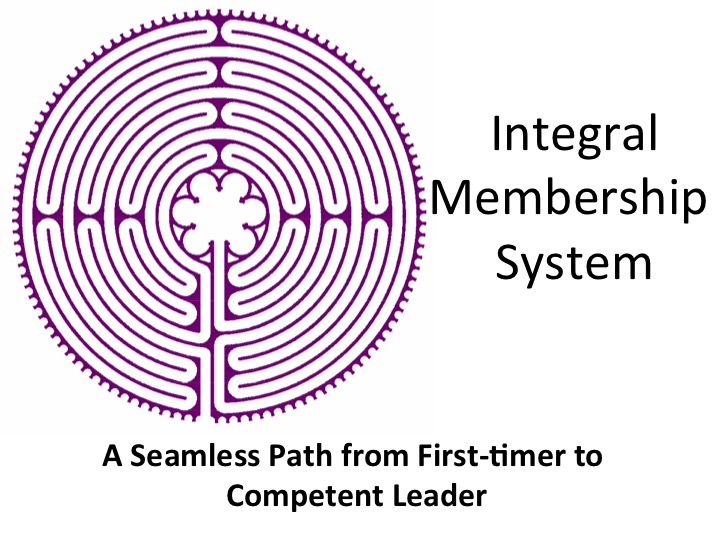
As previously mentioned, absent of an intentional process of developing first-timers into competent leadership over time, the value of ownership emerges by accident rather than by design. In the minister-centric 1st tier ministry model, membership can become a means of propagation rather than a driver of personal and organizational transformation. It can serve to bring people into the fold by “systematizing” their devotion and loyalty as the foundation of their support.
As declining attendance and membership erodes the momentum of church growth, a strategy of increasing numbers as a means of turning the tide seems futile with respect to the long-term sustainability of congregational ministry. Yet, transitioning out of the established practice of bringing people into membership means that we must also transition out of the cultural centrism that makes stakeholders “family members.” Rather than reinforcing the family system dynamic, in an integral ministry practice, people come together as a spiritual cooperative—a community of members who are in cooperation together to fulfill the purpose of the ministry in the lives of members and beyond.
Another inconvenient truth about minister-centric ministry is that there are no structures of accountabilities for voting members. While most church bylaws identify the powers, privileges and status of members, including their removal, if necessary, none adequately addresses voting members’ accountabilities. In other words, who are voting members accountable TO and what are voting members accountable FOR?
To add to the problem, the process for becoming a voting member in minister-centric ministry is often quite simple, with few requirements or qualifications. Because the process is so easy and convenient, there is really no tangible value to membership, beyond having a voice and a vote (providing church politics does not eclipse these privileges). In addition, it is very difficult to cultivate the value of ownership and partnership when the system of becoming a member is not values-based or linked to growing the emotional and spiritual maturity of those who would become members.
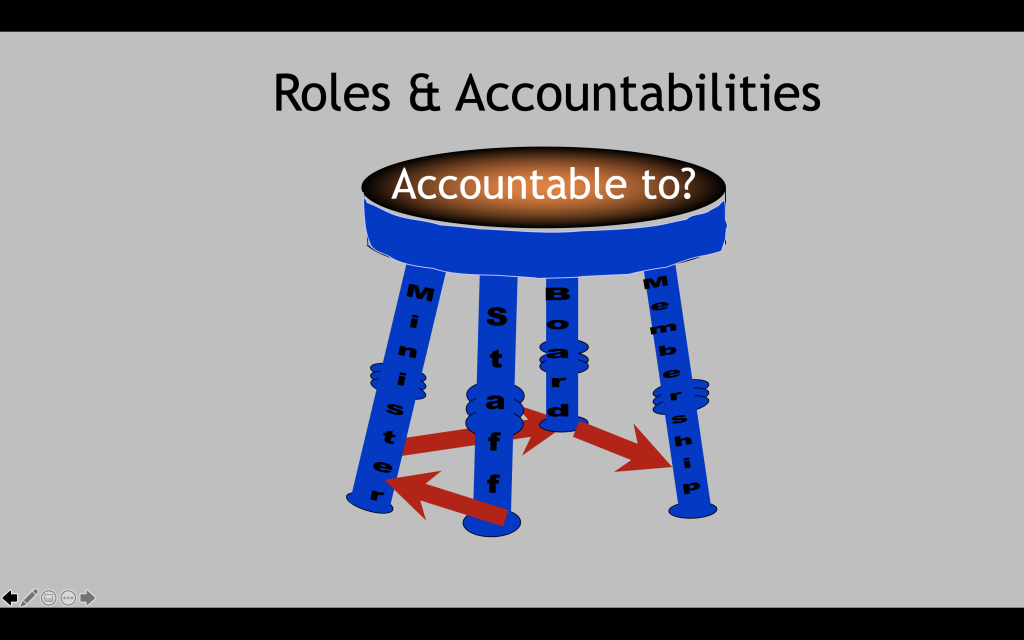
If the current system of welcoming new members fails to include precisely what is “counted on” from those who join the church, with respect to one’s spiritual practice, meaningful involvement, and financial support, the system is reinforcing the dysfunction of a membership body that has no accountabilities. It is not uncommon for ministry leaders to struggle with this conundrum.
Imagine a four-legged stool. The stool represents the “soundness” or the integrity of the organization. The legs of the stool represent the roles of staff, senior minister, board / core council, and voting membership. As we consider the structural issues associated with a four-legged stool, we see the length and integrity of the material composition of each leg can impact the overall capacity of the stool to function (bear the weight of life experience) adequately.
Another consideration is the ground upon which the stool is situated. If the ground is sand rather than solid rock, it is possible for some of the structural issues to remain hidden (an unusually long minister or board leg, for instance). If the ground represents shared purpose and the legs represent the competencies associated with the organizational roles of staff, minister, board, and membership, problems arise when there is no solid ground of mutual intentionality and / or when there is no or ineffective accountability between roles.
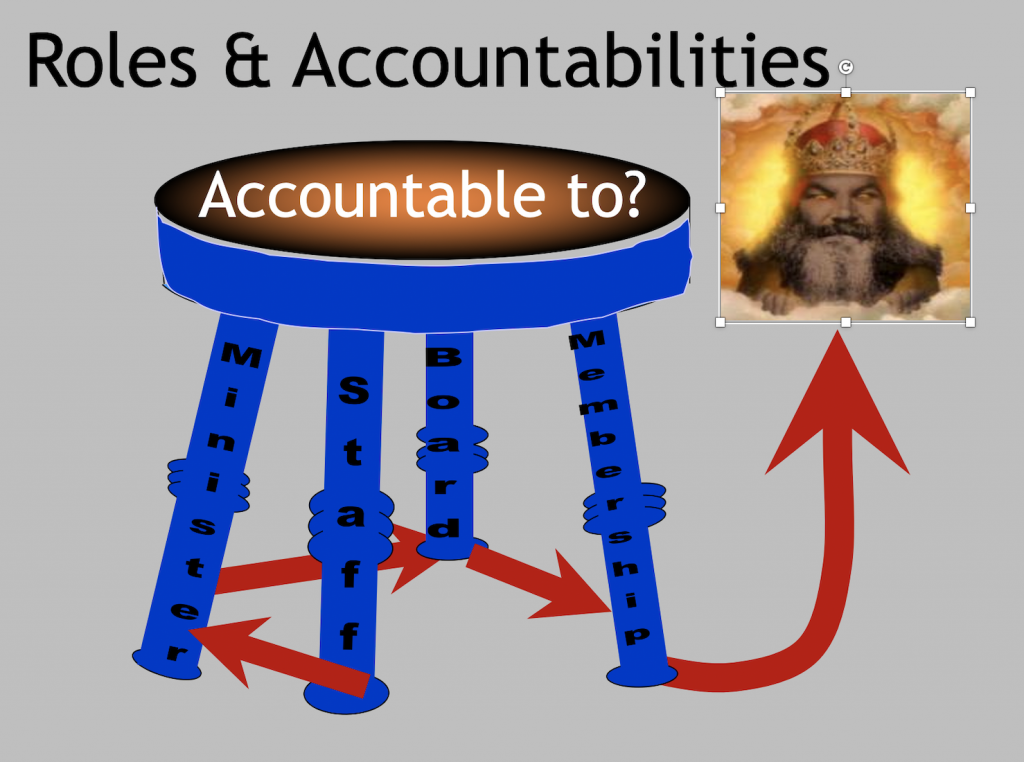
Typically, when ministry leaders are asked who staff members accountable to, they correctly answer, the minister. When asked who the minister is accountable to, they correctly answer, the board / council. When asked who the board / council is accountable to, they correctly say, the voting membership. But, when asked who the voting membership is accountable to, they are speechless. Some, jokingly suggest that the voting membership is accountable to GOD! The stark and inconvenient truth is that there are no structures of accountability for voting members in the minister-centric ministry practice.
A better question for ministry leaders regarding any role and especially the role of voting member is what do we count on each other for? This consideration flattens the “top-down accountable to” convention and reveals a greater reality with respect to all working relationships—we count on each other for things regardless of who we report to. While the staff reports to the minister, both the staff and the minister count on each other for things that have to do with issues of mutuality, empathy, cooperation, and teamwork. While the minister reports to the board / council, both count on each other with respect to communication, competence, follow though, professionalism and integrity. The ministry and the voting members count on each other for financial support, feedback, partnership, and getting things done.
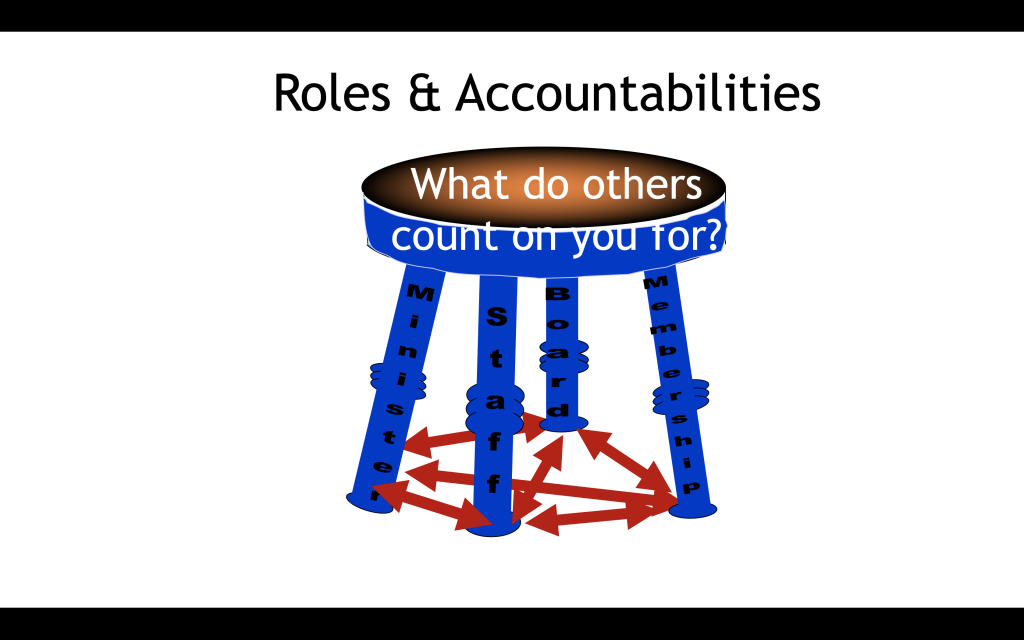
In the realization that we ALL count on each other in ministry, it makes sense to make explicit the things that we need people to DO that fulfills the role, job, task, or initiative. I will go into more detail regarding integral job descriptions and the employee review process later. For now, the main point is to see that the Integral Membership System is both a driver of cultural evolution and a seamless path from first-timers to competent leader.
It is a program that is specifically designed to cultivate the culture of ownership. It’s also a program that creates more organizational complexity.
Although this might seem counterintuitive in some respects, suffice it to say that with more organizational complexity, there is greater capacity to establish structures of accountability.
The labyrinth as both a symbol and as a spiritual practice is a perfect metaphor for the Integral Membership System. As a symbol, it reveals a phased approach to the transformational journey. The first phase, the Entry, represents the first dimension of the Integral Membership System—becoming a Community Member. As in the labyrinth walk, the process of making the journey to the labyrinth’s center is all about transforming one’s life. With regard to the spiritual cooperative, it is all about belonging, deepening one’s spiritual practice and meaningful involvement.
The second phase of the labyrinth walk is the Return, and represents the Governing Member aspect of the process—which is all about giving back—becoming an owner / partner within the ministry. Ownership is about partnering with ministry leaders to fulfill the purpose of the ministry.
With these two phases of the labyrinth in mind, we want to create a program that moves people systematically—first through a transformative experience (Phase One) and then into an intentional path of deepening their capacity to make a positive difference in our world (Phase Two).
There are several considerations to keep in mind when transitioning to the Integral Membership System from an established minister-centric model of ministry.
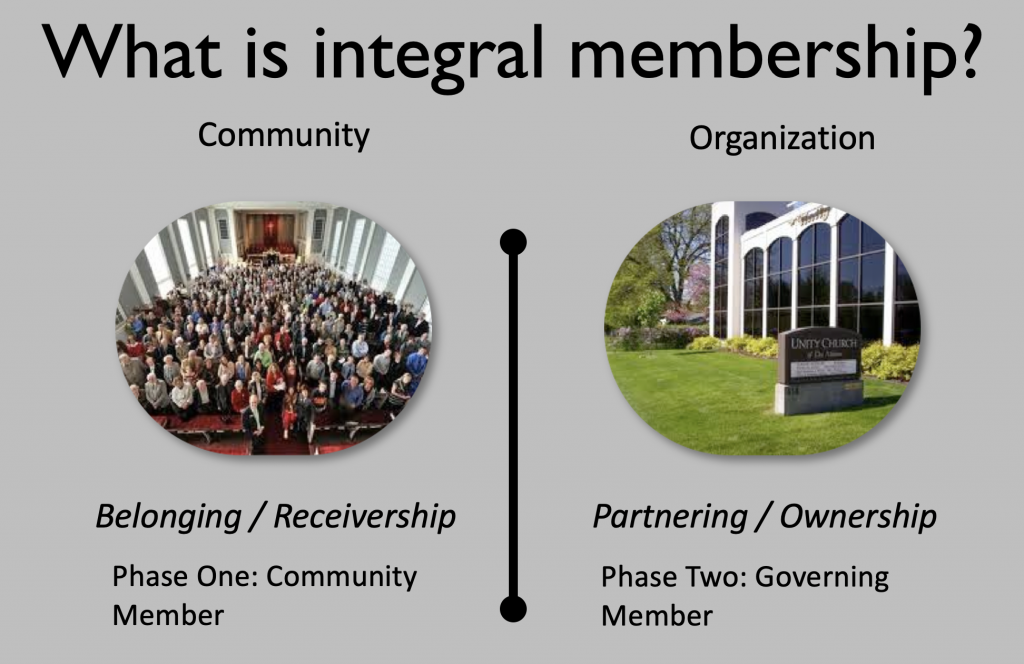
- The funding goal is for 100% of the operational expenses of the ministry to be underwritten by the spiritual cooperative, via automatic giving, i.e. (Tithe.ly App, auto billpay, credit card debit, monthly checks).
- The Community Member role is not an organizational role. It is just a formalization of a person’s desire to belong or to join the ministry. No Bylaw changes are necessary.
- The Integral Membership System is for new people only. All established members are grandfathered into the new system.
- The term of Governing Member is for one year. All governing (voting) members’ terms expire annually and must be renewed. Bylaw changes may be necessary to accommodate annual renewal of membership.
- Community Members become eligible to make application for Governing Membership after one year.
Sample Membership Brochure
Unity Center’s mission is transforming lives and inspiring people to make a positive difference in their world. If this sounds like a purpose that you can get behind, you are invited to join our inclusive and diverse spiritual community.
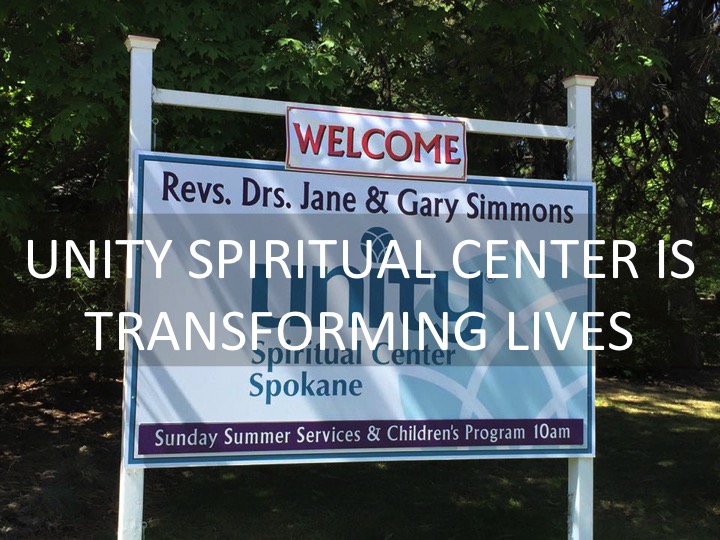
There are two phases of membership in Unity Center, not unlike the two phases of a labyrinth walk. The first phase is called is becoming a Community Member. This is the ENTRY phase of walking the labyrinth—beginning an intentional journey of deepening one’s own spiritual commitment and practice, as well as connecting more personally with others in our community. While there are no requirements for Community Membership, we ask that you say YES to three things that make joining Unity Center extra special:
- We ask that you say YES to deepening your own spiritual practice and education by participating in classes, services, and SpiritGroups small group ministry as you are able. You can choose from a list of classes and small group ministry activities to fulfill this commitment. What classes you take and how involved you become is completely up to you.
- We ask that you say YES to participating in a Spiritual Gifts Assessment program and become involved in some form of meaningful service in our ministry. This program is offered from time to time to assist Community Members in identifying their personal gifts and talents.
- Lastly, we ask that you say YES to a designated level of monthly financial support of Unity Center. You decide. We simply ask that your cooperative share be in integrity with your capacity to contribute to the overall operations of Unity Center. Once again, you decide the amount and how to make it automatic.
The second phase of membership is the RETURN. This symbolizes the Governing Member role. Governing members vote at our Annual Membership Meetings to elect our Board of Trustees, and make decisions about the future of the ministry. Governing Members partner with the ministry’s leadership to insure the sustainability of the organization and the well-being of the community.
Qualifications for new Governing Members include having:
- Been a Community Member (in good standing for at least one year
- Completed the 21-day Quantum Living Process
- Served as a SpiritGroups host, facilitator or group leader, or in some other way that demonstrates leadership
- Participated in other classes, programs, and activities as determined by the ministers and approved by the Board of Trustees.
How to Become a Community Member of Unity Center
Those interested in becoming a Community Member attend a Community Member orientation meeting. Upon completion of the orientation and application process, new Community Members will be officially recognized during the Sunday Service following the Community Member orientation.
How to Become a Governing Member of Unity Center
Governing Members are officially received into our organization once a year, prior to our Annual Membership meeting. Community members who have fulfilled their community member commitments for at least one year are eligible to make application for the Governing Member role. Qualified applicants attend a new Governing Member orientation hosted by the Board of Trustees. New Governing Members will be officially received into membership at the Annual Membership Meeting.

Companion programs to the Integral Membership System are the Welcoming System, the Spiritual Cooperative Share calculation and the Holding Up the Mirror—Understanding Our Financial State, subjects for my next blog post.
Love and blessings, Gary